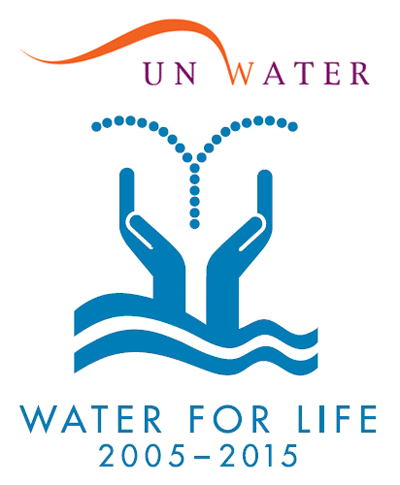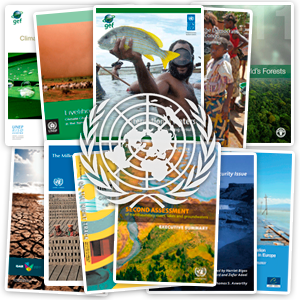- ON THE DECADE
- THE DECADE'S CAMPAIGN
- REPORTING ON PROGRESS
- THE DECADE'S PROGRAMMES
- FOCUS AREAS
-
- Access to sanitation
- Financing water
- Gender and water
- Human right to water
- Integrated Water Resources Management
- Transboundary waters
- Water and cities
- Water and energy
- Water and food security
- Water and sustainable development
- Water and the green economy
- Water cooperation
- Water quality
- Water scarcity
- FOCUS REGIONS
- RESOURCES FOR
- UN e-RESOURCES
Integrated Water Resources Management (IWRM)
Water is a key driver of economic and social development while it also has a basic function in maintaining the integrity of the natural environment. However water is only one of a number of vital natural resources and it is imperative that water issues are not considered in isolation.
Managers, whether in the government or private sectors, have to make difficult decisions on water allocation. More and more they have to apportion diminishing supplies between ever-increasing demands. Drivers such as demographic and climatic changes further increase the stress on water resources. The traditional fragmented approach is no longer viable and a more holistic approach to water management is essential.
This is the rationale for the Integrated Water Resources Management (IWRM) approach that has now been accepted internationally as the way forward for efficient, equitable and sustainable development and management of the world's limited water resources and for coping with conflicting demands.
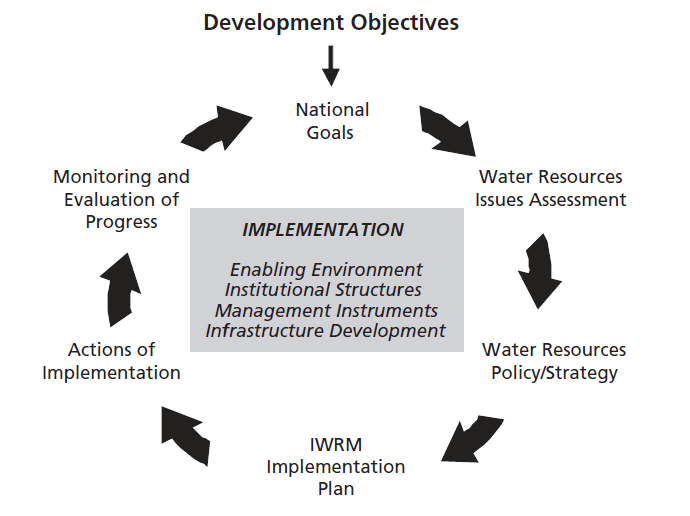
Stages in IWRM planning and implementation
There are great differences in water availability from region to region - from the extremes of deserts to tropical forests. In addition there is variability of supply through time as a result both of seasonal variation and inter-annual variation. All too often the magnitude of variability and the timing and duration of periods of high and low supply are not predictable; this equates to unreliability of the resource which poses great challenges to water managers in particular and to societies as a whole. Most developed countries have, in large measure, artificially overcome natural variability by supply-side infrastructure to assure reliable supply and reduce risks, albeit at high cost and often with negative impacts on the environment and sometimes on human health and livelihoods. Many less developed countries, and some developed countries, are now finding that supply-side solutions alone are not adequate to address the ever increasing demands from demographic, economic and climatic pressures; waste-water treatment, water recycling and demand management measures are being introduced to counter the challenges of inadequate supply.
In addition to problems of water quantity there are also problems of water quality. Pollution of water sources is posing major problems for water users as well as for maintaining natural ecosystems.
In many regions the availability of water in both quantity and quality is being severely affected by climate variability and climate change, with more or less precipitation in different regions and more extreme weather events. In many regions, too, demand is increasing as a result of population growth and other demographic changes (in particular urbanization) and agricultural and industrial expansion following changes in consumption and production patterns. As a result some regions are now in a perpetual state of demand outstripping supply and in many more regions that is the case at critical times of the year or in years of low water availability.
Sources:
- Status Report on Integrated Water Resources Management and Water Efficiency Plans. UN-Water. 2008
- Roadmapping for Advancing Integrated Water Resources Management (IWRM) Processes. UN-Water, GWP. 2007
What is "IWRM"?
IWRM is an empirical concept which was built up from the on-the-ground experience of practitioners. Although many parts of the concept have been around for several decades - in fact since the first global water conference in Mar del Plata in 1977 - it was not until after Agenda 21 and the World Summit on Sustainable Development in 1992 in Rio that the concept was made the object of extensive discussions as to what it means in practice. The Global Water Partnership's definition of IWRM is widely accepted. It states: 'IWRM is a process which promotes the co-ordinated development and management of water, land and related resources, in order to maximize the resultant economic and social welfare in an equitable manner without compromising the sustainability of vital ecosystems.'
Source Integrated Water Resources Management in Action. WWAP, DHI Water Policy, UNEP-DHI Centre for Water and Environment. 2009
UN initiatives that are helping to raise the issue...
- UN-Water Task Force on Indicators, Monitoring and Reporting (2008-2010)
In 2006 a Task Force on IWRM was created by UN-Water, with members drawn from UN-Water agencies and from partner organizations. In May 2008, the Task Force on IWRM completed its mandate when it presented the 'Status Report on Integrated Water Resources Management and Water Efficiency Plans' at the sixteenth session of the Commission on Sustainable Development. In 2008, UN-Water combined the Task Force on IWRM and the Task Force on Monitoring to establish the Task Force on Indicators, Monitoring and Reporting.
To know more
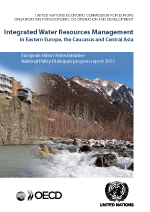 Integrated Water Resources Management in Eastern Europe, the Caucasus and Central Asia. European Union Water Initiative National Policy Dialogues progress report 2013
Integrated Water Resources Management in Eastern Europe, the Caucasus and Central Asia. European Union Water Initiative National Policy Dialogues progress report 2013
United Nations Economic Commission for Europe (UNECE), Organisation for Economic Co-operation and Development (OECD). May 2014
This publication gives an overview of implementation of Integrated Water Resource Management (IWRM) principles and water sector reforms in the countries of Eastern Europe, the Caucasus and Central Asia. The report is structured in accordance with key IWRM principles and it describes the efforts to create institutional and legal frameworks and implement IWRM principles in these countries. It also details the contribution of National Policy Dialogues (NPDs) to this process, and provides conclusions and recommendations for the further development of the NPDs on IWRM.
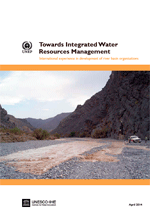 Towards Integrated Water Resources Management. International experience in development of river basin organisations
Towards Integrated Water Resources Management. International experience in development of river basin organisations
United Nations Environment Programme (UNEP). April 2014
This report looks at the development of River Basin Organisations (RBOs) in terms of availability of data, logical demarcation, adequate organisational design, clear mandates, stakeholder participation and transparent decision-making, integrated planning systems and capacity building amongst others. It contains five central chapters including a background on IWRM, Justification for river Basin Management through River Basin Organisations, Types of River Basin Organisations, Decentralisation and Subsidiarity and Development of River Basin Organisations.
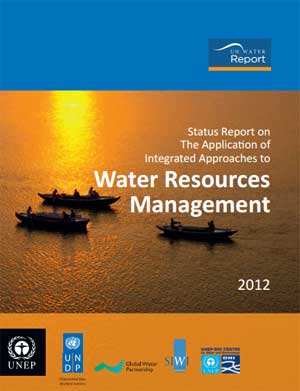 UN-Water Status Report on the Application of Integrated Approaches to the Development, Management and Use of Water Resources 2012
UN-Water Status Report on the Application of Integrated Approaches to the Development, Management and Use of Water Resources 2012 
UN-Water. 2012
Based on a global survey assessing the progress and outcomes of the application of integrated approaches to the development, management and use of water resources, this UN-Water report includes lessons learned and recommendations, as well as focus areas for action. The report also provides guidance for establishing a regular international monitoring and reporting framework to promote sustainable development and management of water resources.
>> Key messages and recommendations from the report [ - 938 KB]
- 938 KB]
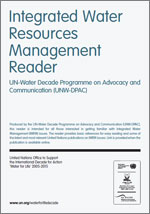 Integrated Water Resources Management - Reader
Integrated Water Resources Management - Reader
[ - 147 KB]
- 147 KB]
UN-Water Decade Programme on Advocacy and Communication (UNW-DPAC). 2010
This reader is intended for all those interested in getting familiar with Integrated Water Management (IWRM) issues. The reader provides basic references for easy reading and some of the latest and most relevant United Nations publications on IWRM issues. Link is provided when the publication is available online.
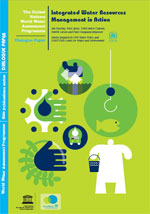 Integrated Water Resources Management in Action
Integrated Water Resources Management in Action
[ - 1.25 MB]
- 1.25 MB]
World Water Assessment Programme (WWAP), DHI Water Policy, UNEP-DHI Centre for Water and Environment. 2009
This paper sets out to explore some of the practical aspects of the implementation of Integrated Water Resources Management (IWRM). It covers the following aspects: 1) the relevance of IWRM for a number of key development issues, 2) the key characteristics of the concept, 3) the global status of IWRM, 4) practical implementation - the challenges, 5) practical implementation - case studies showing successful applications to problematic management scenarios, and 6) how IWRM programmes are being linked with the Millennium Development Goals and adaptation to climate change by the setting of achievement milestones.
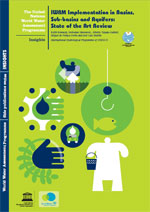 IWRM Implementation in Basins, Sub-basins and Aquifers: State of the Art Review [
IWRM Implementation in Basins, Sub-basins and Aquifers: State of the Art Review [ - 396 KB]
- 396 KB]
World Water Assessment Programme (WWAP), UNESCO-International Hydrological Programme (IHP). 2009
This publication reviews currently available information on cases related to IWRM and Integrated River Basin Management (IRBM) and summarizes these findings with some conclusions and recommendations.
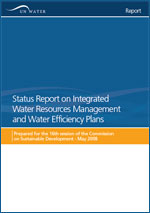 Status Report on Integrated Water Resources Management and Water Efficiency Plans [
Status Report on Integrated Water Resources Management and Water Efficiency Plans [ - 1.73 MB]
- 1.73 MB]
UN-Water. 2008
This Report aims to illustrate progress made on meeting the target to "Develop integrated water resources management and water efficiency plans by 2005, with support to developing countries, through actions at all levels" agreed at the World Summit on Sustainable Development (WSSD) in Johannesburg in 2002, through the Johannesburg Plan of Implementation. The Report is based on a survey covering 104 countries of which 77 are developing or countries in transition and 27 are developed.
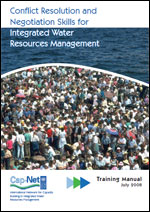 Conflict Resolution and Negotiation Skills for Integrated Water Resources Management. Training Manual
Conflict Resolution and Negotiation Skills for Integrated Water Resources Management. Training Manual
[ - 1.58 MB]
- 1.58 MB]
Cap-Net, United Nations Development Programme (UNDP). 2008
Within the framework of IWRM, the intention of this manual is to provide the necessary general information and specific tools in a user-friendly way so that any water resource stakeholder may be able to resolve existing or head-off impending disputes in a way agreeable to all parties. The emphasis in this manual is on Alternative Dispute Resolution (ADR), in particular, principled negotiation - an approach that seeks to embed outcomes and processes that will serve sustainable, equitable and efficient long-term social needs.
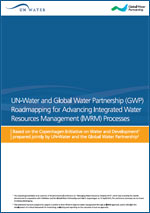 Roadmapping for Advancing Integrated Water Resources Management (IWRM) Processes [
Roadmapping for Advancing Integrated Water Resources Management (IWRM) Processes [ - 961 KB]
- 961 KB]
UN-Water, Global Water Partnership (GWP). 2007
This statement has been prepared to support countries in their efforts to improve water management through an IWRM approach, and to stimulate the development of a robust framework for monitoring, evaluating and reporting on the outcomes of such an approach.
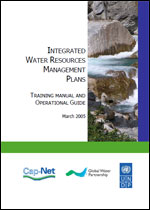 Integrated Water Resources Management Plans. Training Manual and Operational Guide [
Integrated Water Resources Management Plans. Training Manual and Operational Guide [ - 924 KB]
- 924 KB]
Cap-Net, United Nations Development Programme (UNDP), Global Water Partnership (GWP). 2005
This training material is intended for a 3-4 day course on how to achieve a water resources management plan that brings in the principles of IWRM. Useful tools are identified to support the planning process in each step. While the material is targeted for national IWRM plans it is readily adaptable for basin level planning and trainers.
IWRM for sustainable use of water. 50 years of international experience with the concept of integrated water management [ - 629.94 KB]
- 629.94 KB]
Food and Agriculture Organization of the United Nations (FAO). 2004
This background document provides a brief overview of the development of the concept of Integrated Water Resources Management.
IWRM at the river basin level
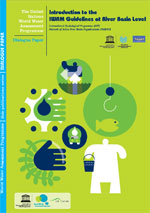 Introduction to the IWRM guidelines at river basin level
Introduction to the IWRM guidelines at river basin level
[ - 6.57 MB]
- 6.57 MB]
World Water Assessment Programme (WWAP), UNESCO-International Hydrological Programme (IHP). 2009
These Guidelines provide information to help practitioners implement IWRM in line with their own set of circumstances. They consist of the fundamental concepts of IWRM as well as provide insights into the perspectives of various stakeholders with regard to water issues, keys for success for overcoming problems, and good examples where such keys for success were applied. This first publication serves as an introduction to the Guidelines and outlines the main points contained within them.
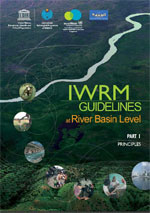 IWRM Guidelines at River Basin Level. Part 1: Principles
IWRM Guidelines at River Basin Level. Part 1: Principles
[ - 1.93 MB]
- 1.93 MB]
UNESCO-International Hydrological Programme (IHP), World Water Assessment Programme (WWAP), Network of Asian River Basin Organizations (NARBO). 2009
Part 1 of the Guidelines provides basic principles of IWRM and explains the benefits of IWRM at river basin level and the need to promote it at the policy level. It also proposes a spiral model of IWRM, which illustrates the evolving and dynamic nature of the IWRM process.
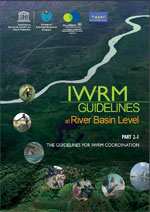 IWRM Guidelines at River Basin Level. Part 2-1: The Guidelines for IWRM Coordination [
IWRM Guidelines at River Basin Level. Part 2-1: The Guidelines for IWRM Coordination [ - 7.91 MB]
- 7.91 MB]
UNESCO-International Hydrological Programme (IHP), World Water Assessment Programme (WWAP), Network of Asian River Basin Organizations (NARBO). 2009
'The Guidelines for IWRM Coordination' is intended for practitioners involved in IWRM coordination. It can be used as introductory guidance for those tackling IWRM for the first time, or as training material for intermediary practitioners and trainers of IWRM. For IWRM experts, it can be used as a reference guide to tackle the various issues and problems they face in their IWRM activities.
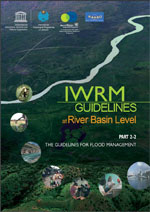 IWRM Guidelines at River Basin Level. Part 2-2: The Guidelines for Flood Management [
IWRM Guidelines at River Basin Level. Part 2-2: The Guidelines for Flood Management [ - 5.44 MB]
- 5.44 MB]
UNESCO-International Hydrological Programme (IHP), World Water Assessment Programme (WWAP), Network of Asian River Basin Organizations (NARBO). 2009
'The Guidelines for Flood Management' is intended for IWRM practitioners of flood management. It is intended to be used as introductory guidance for those tackling IWRM for the first time, or as training material for intermediary practitioners and trainers of IWRM. For IWRM experts, it can be used as a reference guide to tackle the various issues and problems they face in their IWRM activities.
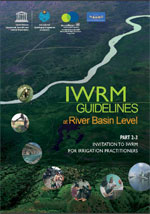 IWRM Guidelines at River Basin Level. Part 2-3: Invitation to IWRM for Irrigation Practitioners [
IWRM Guidelines at River Basin Level. Part 2-3: Invitation to IWRM for Irrigation Practitioners [ - 3.56 MB]
- 3.56 MB]
UNESCO-International Hydrological Programme (IHP), World Water Assessment Programme (WWAP), Network of Asian River Basin Organizations (NARBO). 2009
The 'Invitation to IWRM for Irrigation Practitioners' is intended for IWRM practitioners tackling irrigation planning. The Invitation consists of three parts: 1) sectoral perspectives, 2) key for success, and 3) IWRM process.
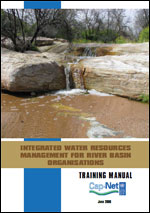 Integrated Water Resources Management for River Basin Organisations. Training Manual [
Integrated Water Resources Management for River Basin Organisations. Training Manual [ - 1.53 MB]
- 1.53 MB]
Cap-Net, United Nations Development Programme (UNDP). 2008
The purpose of this training material is to improve efficiency and effectiveness in the application of integrated water resources management (IWRM) for sustainable management and development of water resources. The training is particularly targeted at the staff of river basin organisations (RBOs).
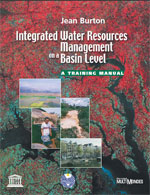 Integrated Water Resources Management on a Basin Level. A Training Manual [
Integrated Water Resources Management on a Basin Level. A Training Manual [ - 1.53 MB]
- 1.53 MB]
United Nations Educational, Scientific and Cultural Organization (UNESCO). 2003
This manual is an introduction to the principles underlying the integrated water resources management concept: the focus is on the approaches and management tools that facilitate its application, taking into account the size of the territory, whether it is national and international basins or sub-basins of local interest. This manual is destined first to trainers who, through a national or a regional seminar, would bring the participants to produce a diagnosis of their basin and an action plan. The manual is divided into two sections. The first one, of a more conceptual nature, presents a review of several definitions and some of the most pressing issues related to integrated basin-wide management. The second section of the manual, aimed at training, takes the reader and the trainer through the steps of the management framework.
Cases from the regions
Asia
Guidelines with regard to developing legislative and institutional frameworks needed to implement IWRM a the national level in the ESCWA region
[
 - 1.30 MB]
- 1.30 MB]
United Nations Economic and Social Commission for Western Asia (UNESCWA). 2007
This study provides ESCWA member countries with guidelines on how to implement Integrated Water Resources Management national strategies, with particular focus on institutional and legal dimensions. The study: (a) assesses the status of institutional and legislative settings; (b) evaluates the progress towards implementing institutional reforms within IWRM national strategies as well as challenges, constraints and gaps; (c) proposes scenarios for the implementation of legal and institutional reforms; (d) reviews institutional and legislative measures taken by developed and developing countries; and (e) presents a set of recommendations to ESCWA member countries on how to enhance institutional and legal reforms in order to implement IWRM at the national/local levels.
Enhancing the application of Integrated Water Resources Management in the ESCWA region [ - 646.45 KB]
- 646.45 KB]
United Nations Economic and Social Commission for Western Asia (UNESCWA). 2004
This overview report introduces the process of Integrated Water Resources Management (IWRM) to senior policy and decision makers with the aim of mobilizing political and decision support to implement IWRM at the basin, national and regional levels.
Europe
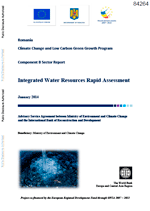 Romania: Integrated Water Resources Rapid Assessment
Romania: Integrated Water Resources Rapid Assessment
World Bank. January 2014
The purpose of this report is to assess the climate change impacts on water resources in Romania from an integrated, multi-sectoral perspective, and to recommend priority actions for addressing the identified risks and opportunities. The analysis is presented from an integrated water resources perspective, thereby including all pertinent water-related sectors, viz. municipal water supply and sanitation, industrial water supply, agriculture, energy generation, environment, and disaster management. The recommended priority actions are presented in the context of consideration for possible financing under the operational programs funded by the European Structural and Investment Funds (ESIF) in 2014-2020 planning horizon. This analysis is based on the available information on the current status of water resources sector in Romania, along with the existing knowledge on the anticipated impacts of climate change in this sector.
>> Water for Life Voices campaign
>> Submit your voice!
>> Your #WaterForLifeVoices on Flickr
![]() Flickr
Flickr
![]() Slideshare
Slideshare
![]() Twitter
Twitter
![]() YouTube
YouTube

>> Outcome Document from OWG on Sustainable Development Goals
>> A Post-2015 Global Goal for Water: Synthesis of key findings and recommendations from UN-Water 
>> Post 2015 Water Thematic Consultation Report
>> Report of the High-Level Panel of Eminent Persons on the Post-2015 Development Agenda
>> UN-Water section on water in the post-2015 process
>> UN post-2015 agenda
>> DESA section on Post-2015
>> JMP Post-2015 global monitoring
>> Sustainable Development Goals e-Inventory
>> Summary of Stock taking meeting of Intergovernmental Negotiations on the Post-2015 Development Agenda
>> Synthesis Report of the Secretary-General on the Post-2015 Agenda
>> Decade's weekly
The Decade's weekly brings you every week the latest news from the Decade.
>> Bimonthly Publications Review 25, 26 and 27 [ - 546 Kb]
- 546 Kb]
UNW-DPAC. May 2015
>> Previous issues
Sustainable Development
15-17 January 2015: UN-Water International Zaragoza Conference ‘Water and Sustainable Development: From vision to action’
22 March 2015: World Water Day on Water and Sustainable Development
Biodiversity
2011-2020: UN Decade on Biodiversity
Deserts and Desertification
2010-2020: UN Decade for Deserts and the Fight Against Desertification
Energy
2014-2024: Decade on Sustainable Energy for All
22 March 2014: World Water Day on 'Water and Energy'
Sanitation
2011-2015: Sustainable sanitation: The Five-Year-Drive to 2015
19 November 2014: World Toilet Day
Copyright | Terms of use | Privacy notice | Site Index | Fraud alert | Help







